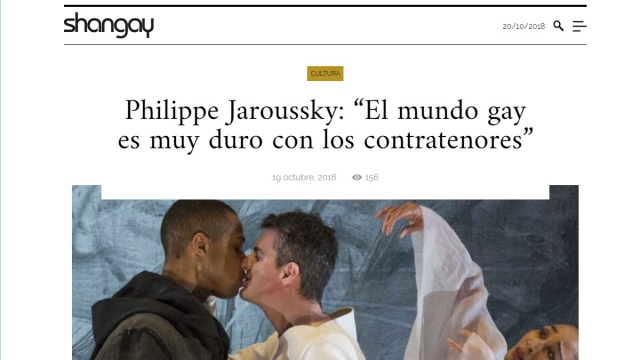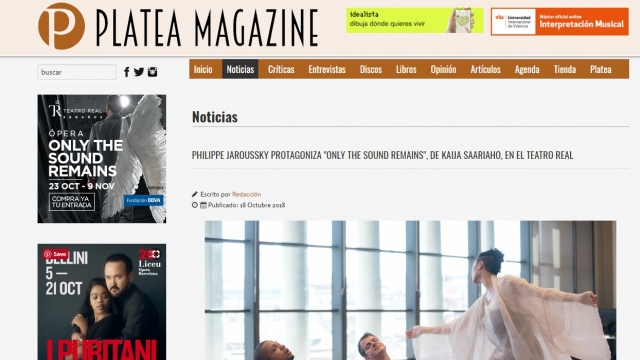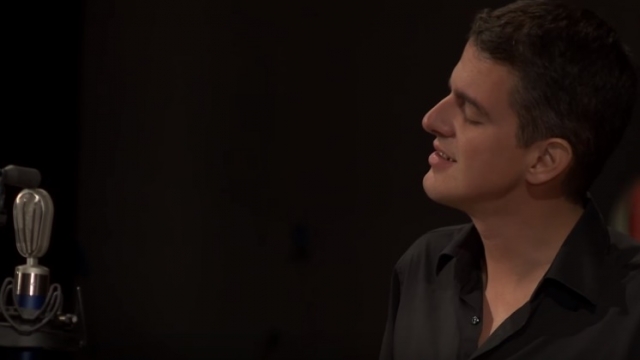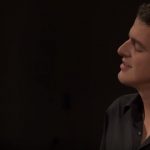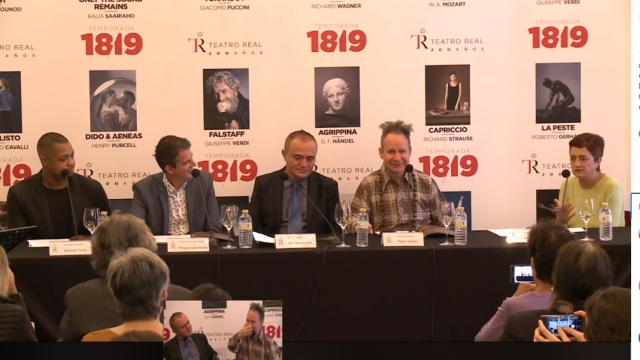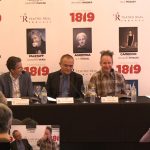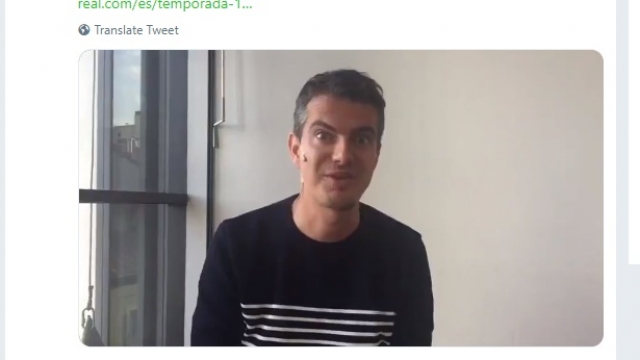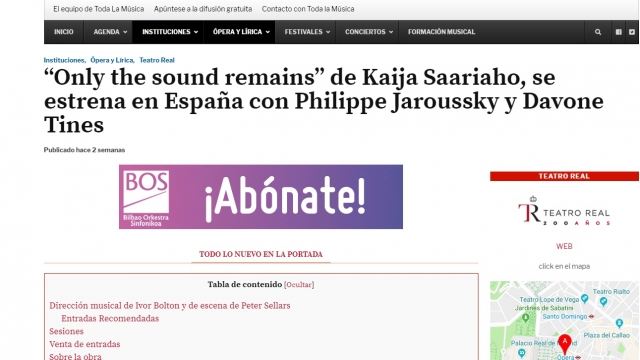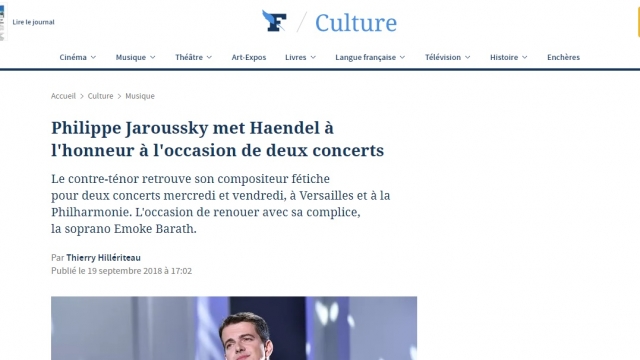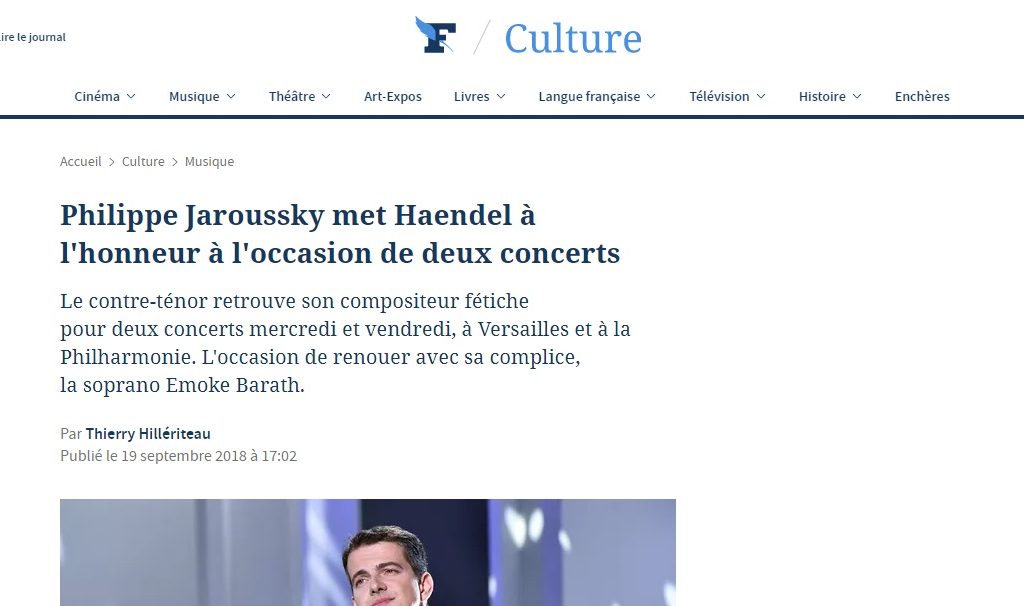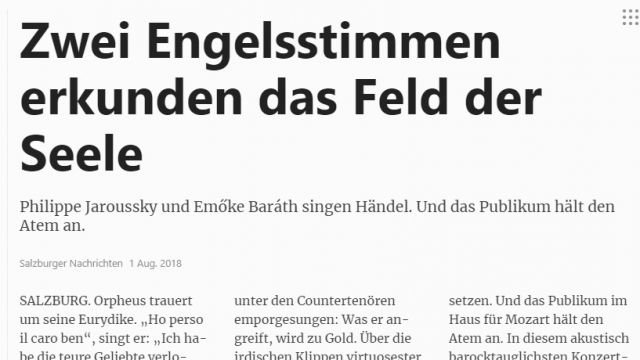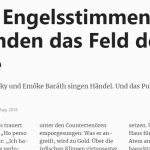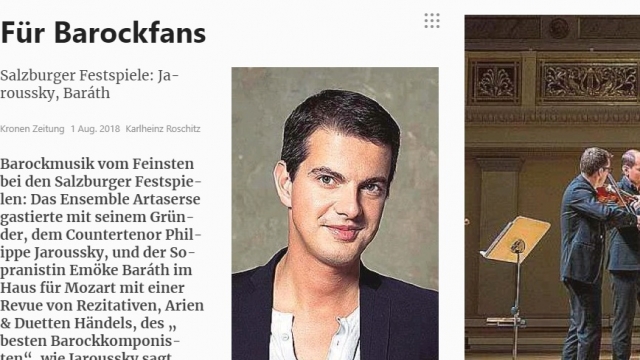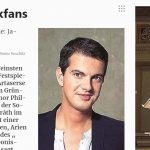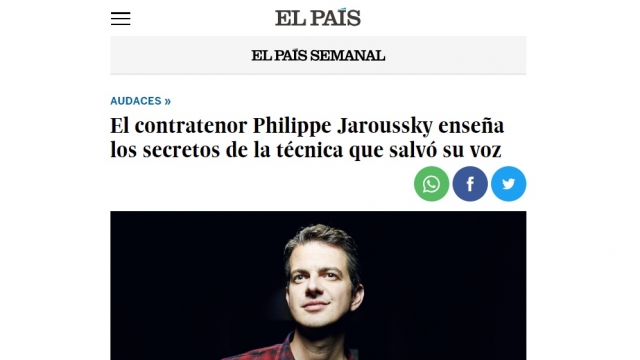2018-07-20, El País. by Virginia López Enano
“Mis alumnos me recuerdan la ilusión que tenía al principio y me han enseñado que todavía puedo cantar mejor”
[…]
La clase de música está a punto de comenzar para los más pequeños de la academia. Macéo ha sido el primero en llegar. Su idea era tocar el piano, pero ha descubierto que le encanta sentir en el pecho la vibración del chelo. Aún no sabe si es su pasión, pero quizá Jaroussky pueda sentirse orgulloso dentro de unos años de haber ayudado a convertir al joven Macéo en un músico de éxito.
Translation to English
This is a fan translation; no infringement of copyright is intended. We believe it fulfills the criteria for “fair use,” discussion and study. Translation by *L
Countertenor Philippe Jaroussky teaches the secrets of the technique that saved his voice
caption: The French countertenor Philippe Jaroussky, photographed in Paris. By Lea Crespi
by Virginia López Enano
The French countertenor – one of the most famous Classical artists – leads a life between tours and an academy where he promotes the career of young talents and passes on the technique that saved his career.
The Île Seguin rises from the Seine as she takes her course through the West of Paris. The austere building of La Seine Musicale emerges from it, and at the top, its glass dome looks like a gigantic soap bubble that escapes to the river. Here, in one of the corridors of this center of cultural activities, the countertenor Philippe Jaroussky (born in Maisons-Laffitte, 1978) has started an academy. He founded it a year ago to discover talented children from homes with little access to resources, to boost the career of young talents and to pass on the vocal technique that saved his career two decades ago.
caption: During a master class with a student, the baritone Louis de Lavignère.
Jaroussky has become one of the most famous Classical artists of the moment, but it was not always clear that his path would eventually cross with opera. At age 10, he was a restless kid who liked to sing in class and who didn’t belong to a family of musicians. His natural talent caught the attention of one of his teachers, who informed his parents of their son’s abilities. Following the teacher’s advice, they pointed him to violin. “Without him, I would never have dedicated myself to music,” he now confesses, in one of the classrooms of the Académie Musicale Philippe Jaroussky. For that reason, one of the objectives that the singer has set for himself now is to return the favor. “After 20 years of career, I thought it was my turn to offer the same opportunity. Without any musical background, it is difficult to begin. Because of that, a lot of talent is wasted. If a child discovers that music is their passion, their life will change completely. It happened to me.”
Starting out as a baritone, little by little he found himself being attracted by the register that traditionally belonged to the extinct “castrati.”
The violin was his first contact with an instrument, but Jaroussky owes his career to his voice. Starting out as a baritone, little by little he found himself being attracted by the register that traditionally belonged to the extinct “castrati”: that of a countertenor. The highest of male voices, a flexible, feminine, powerful and mystical sound – quite unusual at the time when Jaroussky, who will sing at the Teatro Real from October 23 to November 9, began debuting at the concert halls, and much better known now thanks to him. Singing with the face of a child and the voice of a woman, the French star impacted the world of Classical and – together with leading figures such as the mezzo-soprano Cecilia Bartoli – he has been a protagonist of the Baroque repertoire and elevated it to the very top. He collaborated with the best current ensembles, such as Les Arts Florissants and Les Musiciens du Louvre-Grenoble, and [performed] at major venues such as the Concertgebouw in Amsterdam. He sells out the largest theaters and is among Classical music’s best selling artists.
caption: Jaroussky gives instructions to one of his singing students.
Together with leading figures such as the mezzo-soprano Cecilia Bartoli, he has been a protagonist of the Baroque repertoire.
However, for anyone who isn’t familiar with his immense musical career, it would take a couple of minutes to distinguish the teacher from the student in the singing class. Jaroussky has the the left leg of his pants tucked into his sock – the other is above it. He’s wearing his jeans somehow baggy. The watch on his right wrist. The sleeves of the red checkered shirt that he wears over a t-shirt are rolled up to the elbows, and the top button is open. He is 40 years old, but he keeps the appearance of a teenager – with gray hair and the face of a child. Jaroussky gets up from the piano stool, approaches Clarisse Dalles, one of the seven singing students of the academy, and grabs her cheeks. “Breathe!” he shouts. And when the young soprano starts again with the aria from The Marriage of Figaro, Jaroussky opens his eyes wide, addressing the audience in the classroom: “You do not see many countesses like that. And she’s only 22 years old! ” All his students tell the same thing: he never gives up. When he wants something, he never stops until he has achieved it. “But he’s sympathetic and kind,” adds Dalles. And generous as well. “There aren’t many Classical artists with a reputation like that of Philippe, and he has given us the opportunity to benefit from his visibility. It is very important, because as young musicians we don’t have a structure to help us start our career when we finish the conservatory.”
The soprano tells us that the director of the Royal Opera of Versailles called Jaroussky because the countertenor of a production got sick and they needed a replacement. Jaroussky gave him the name of William Shelton, Dalles’ classmate. Shortly after, the young performer was debuting with Les Arts Florissants.
caption: Two children play in the classroom, shortly before the class begins.
But beyond providing opportunities and contacts, the goal of Jaroussky is to teach them how to care for and keep their voice to get the most out of it. The countertenor perfectly understands the impatience of the young musicians to sound better and more powerful: “It happened to me too. At first everything was easy. My voice was flexible but not very big and I was worried about having to make it heard in the concert halls. I started to get tired because the effort I made was excessive, and that caused me little problems for a couple of years until, thanks to a teacher, I managed to build another way of singing. It was a patient work. I think the time has come to pass on the fruit of this 20-year work that saved my voice. ”
“My students remind me of the excitement I had at the beginning and they have taught me that I can still sing better.”
Only for the summer already, his schedule will take him to Lithuania, Switzerland, Belgium, Austria, Norway,… And even so, he assures that it is easy to combine it with other projects because he schedules his concerts two or three years in advance. He enjoys his new facet as a teacher, and he realized that he doesn’t only gives lessons, but also receives them: “I ask my students for things that I did not do at their age. As a young man I didn’t listen too much, I was a bit of a lazy student. They have given me a lot of energy. They remind me of the excitement I had at the beginning of my career and I have been taught that I can still sing better, and that is fantastic.”
caption: A cello lesson
The music class is about to start for the youngest of the academy. Macéo was the first to arrive. His idea was to play the piano, but he has discovered that he loves to feel the vibration of the cello in his chest. He still does not know if it’s his passion, but maybe Jaroussky can feel proud in a few years of helping to turn the young Macéo into a successful musician.
Source/Read more: [x]

